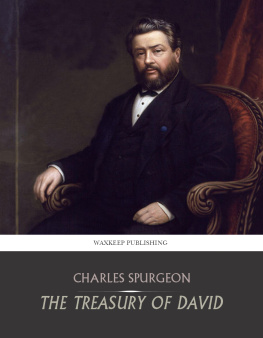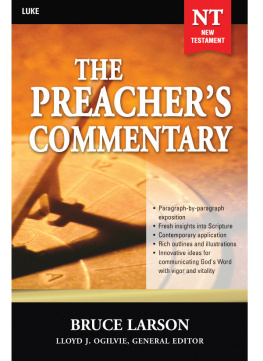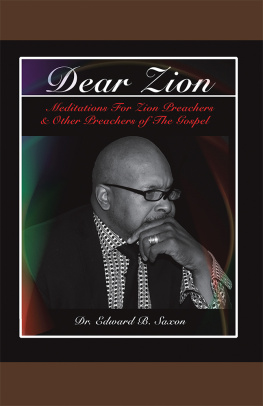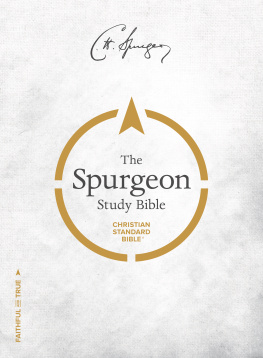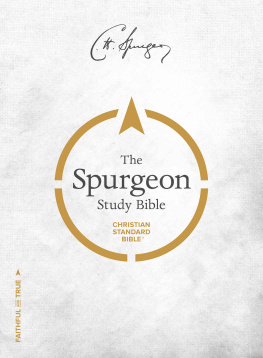Charles Edward Jefferson - Quiet hints to growing preachers in my study
Here you can read online Charles Edward Jefferson - Quiet hints to growing preachers in my study full text of the book (entire story) in english for free. Download pdf and epub, get meaning, cover and reviews about this ebook. City: New York, year: 1901, publisher: T.Y. Crowell & Co, genre: Science. Description of the work, (preface) as well as reviews are available. Best literature library LitArk.com created for fans of good reading and offers a wide selection of genres:
Romance novel
Science fiction
Adventure
Detective
Science
History
Home and family
Prose
Art
Politics
Computer
Non-fiction
Religion
Business
Children
Humor
Choose a favorite category and find really read worthwhile books. Enjoy immersion in the world of imagination, feel the emotions of the characters or learn something new for yourself, make an fascinating discovery.
- Book:Quiet hints to growing preachers in my study
- Author:
- Publisher:T.Y. Crowell & Co
- Genre:
- Year:1901
- City:New York
- Rating:5 / 5
- Favourites:Add to favourites
- Your mark:
- 100
- 1
- 2
- 3
- 4
- 5
Quiet hints to growing preachers in my study: summary, description and annotation
We offer to read an annotation, description, summary or preface (depends on what the author of the book "Quiet hints to growing preachers in my study" wrote himself). If you haven't found the necessary information about the book — write in the comments, we will try to find it.
Quiet hints to growing preachers in my study — read online for free the complete book (whole text) full work
Below is the text of the book, divided by pages. System saving the place of the last page read, allows you to conveniently read the book "Quiet hints to growing preachers in my study" online for free, without having to search again every time where you left off. Put a bookmark, and you can go to the page where you finished reading at any time.
Font size:
Interval:
Bookmark:
Contents
#1
Why All This?
P LEASE let me shut the door. We are here alone, Brothers, and we want no eavesdroppers. Human ears are sensitive; and if we do not speak in quiet tones, I fear the laity may come flying as doves to our windows. It is characteristic of human nature to be interested in what is intended for somebody else. A short time ago I invited into my study a company of laymen that we might have a confidential chat concerning certain matters relating especially to the people in the pews, but before the evening was far advanced my invited guests were crowded completely into a corner by the throng of ministers who came rushing in. I had spoken only briefly when a minister began suggesting things which laymen ought to hear, and when at last my talk was finished the most robust Amen which reached my ears came from the approving throat of a clergyman. I fear therefore that should our present meeting be noised abroad it would be necessary to adjourn from the study to the church auditorium and possibly to the public square: for nothing so stirs the curiosity of laymen as the things which ministers discuss in secret.
I have long wished, Brothers, to talk over with you certain things which are so delicate in their nature one hesitates to mention them, but which are of so great importance to us clergymen and to the church universal, that silence concerning them cannot be commended. What I shall say is not said as criticism but rather as suggestion and admonition. Some of you have written to me, others of you have come to see me from time to time concerning perplexities in your work, and there are other things no doubt on your mind which you have not yet had opportunity to mention. In order that we might have a good confidential talk together about these things of moment to us all, I have opened wide my study door and asked you to come in. You are all, I see, younger men than I am, and therefore I can speak with greater plainness and fuller freedom. But however frank and bold my utterance, Brothers, not one syllable shall be spoken to hurt, but every syllable to help. I am not a sour-eyed censor of ministerial morality, nor do I wish to swell the chorus of that hoarse-voiced company just now shouting the ministers dispraise. I have no sympathy with the men who persist in the affirmation that most ministers preach what they do not believe, nor do I accept the dictum laid down with gravity by sneering judges that if preachers could only preach a little all the churches would be filled. The stormy lamentations of those who would make the Seminaries hopelessly antiquated institutions and most recent graduates anointed numskulls, are in my judgment sound and fury signifying nothing. But a man with open eyes cannot fail to see that in the ecclesiastical world, as in every other, there are stumblings and failings and fallings, and if his heart be sympathetic he cannot but wish to help his brothers avoid the pitfalls into which some have fallen and safeguard them from forms of conduct which weaken and offend. Ministers as a body are I think the best men living on the earth. I could fill a dozen evenings with praises of the pulpit saints whom I have known. In purity of motive ministers as a class surpass the lawyers, in breadth of sympathy the physicians, in fidelity to principle the editors, in self-sacrifice the merchants, in moral courage the soldiers, in loftiness of ideals the teachers, in purity of life the highest classes in our best society. This is not said boastfully but gratefully as a fact not to be disputed. But ministers to be as good as other classes of men must be better than they. No other set of men make such assumptions or bind themselves to such high ideals. A lawyer when admitted to the bar does not promise to obey the Ten Commandments. A physician on receiving his diploma does not agree to practice the Sermon on the Mount. Being an editor involves no assumption of fidelity to gospel principles, and merchants do not enter business announcing to the world their purpose to give their life a ransom for others. If therefore both in spirit and conduct ministers as a body were not superior to every other class of men they would be a disgrace to their profession and a scandal to the world. While all men, no matter what their calling, are under the eternal law of God, and therefore morally-bound to keep the ten commandments and to live in the spirit of the Sermon on the Mount, yet as clergymen are the only men who voluntarily confess these obligations and give their life to the work of making them real to other men, it follows that more may rightfully be expected of them than from any other tribe of workers in our modern Israel.
Much is rightfully expected and much also is received. To be sure there is a scapegrace here and there, and of not a few clerical workmen there is abundant reason to be ashamed, but in a world like this, universal piety and wisdom among the professed servants of religion is as impossible to-day as it was when Jesus chose his dozen men one of whom was Judas. Taking the clerical body as a whole it is made up of honest, capable, faithful men.
But a man may be all this and still fail. There are infirmities of temper and infelicities of conduct which, while hardly falling into the category of sins, are none the less so disastrous in their effects on spiritual life as to be worthy of a place among those evils from which one should pray to be delivered. Ministers with rare exceptions are neither rogues nor hypocrites, but being human they are capable of all sorts of distorted action, and the very nature of their work exposes them to a multitude of dangers from which other men are on the whole exempt. Many a man in the ministry fails, not because he is bad, but because he has a genius for blundering. Men with ability sufficient to carry them to distinction fail to rise because of foibles and oddities which they seem unable to shake off. O if he would only quit that! How frequently that doleful exclamation has fallen from the lips of the despairing saints. Even slight defects in clergymen are momentous because they live always in a light as searching and intense as that which beats upon a throne. What other man in the community makes such constant self-disclosures as the minister? His eyes, lips, teeth, facial expression, voice, mind, heart, moods, all these are subjected to public scrutiny. Whatever is crooked or unchristian in him is certain to come out. The Scripture says the saints shall judge the world. It is their special province and delight to judge those who minister to them in spiritual things. Since this is so, there is reason, Brothers, why we, of all men, should walk circumspectly, redeeming the time.
#2
A Mirror for Ministers
P ROBABLY no other man in the town is subjected to such a constant stream of criticism as the minister, and possibly no other man profits so little by criticism as he. This is not because of the rhinoceros quality of the ministerial skin, but because the criticism does not reach him. Those who make the fiercest onslaughts on him get in their best work when he is not in sight. Even the glib-tongued experts become silent on his approach. Other men are censured to their face. The tough meat sold by the butcher brings an immediate and audible response. The merchant who sells unsatisfactory goods must take the condemnation which is sure to come. If the editor offends in word or deed, the next mail brings him condemning letters. The mechanic who scamps his work is promptly overhauled. The servant who shirks his duties is reprimanded or dismissed. But who is bold enough to face a clergyman, and tell him of his sins?
Theres such divinity doth hedge a king,
That treason can but peep to what it would.
And there is such divinity doth hedge a preacher that dissatisfaction dares but whisper what it feels. Outside the hedge disapprobation makes wry faces and detraction does its deadly work while within the hedge the minister lives on in ignorance of his critics strictures, untouched by what the parish thinks and says. Disgruntled men sputter at the Sunday dinner-table in the presence of their children, and women in divers places drop acidic observations, but, alas, the man who ought to be helped by this discriminating wisdom is left to flounder in the morass into which he has fallen, and dies at last in his sins.
Next pageFont size:
Interval:
Bookmark:
Similar books «Quiet hints to growing preachers in my study»
Look at similar books to Quiet hints to growing preachers in my study. We have selected literature similar in name and meaning in the hope of providing readers with more options to find new, interesting, not yet read works.
Discussion, reviews of the book Quiet hints to growing preachers in my study and just readers' own opinions. Leave your comments, write what you think about the work, its meaning or the main characters. Specify what exactly you liked and what you didn't like, and why you think so.


